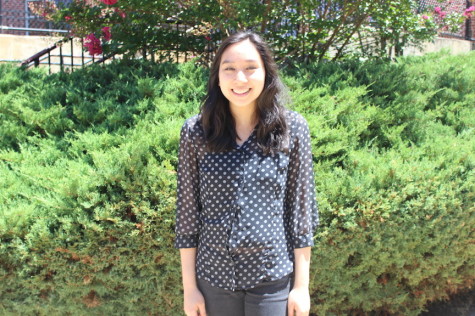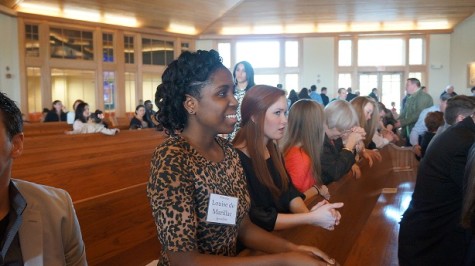Senior Magnet students present their year-long research projects

Displayed in the Freshmen Academy cafeteria are the final factors of the Senior Magnet Presentations, the tri-fold boards that students work on to illustrate their data and findings in totality.
December 9, 2014
After multiple sleepless nights and perpetual hours of practicing, Magnet seniors presented their year-long research projects on December 6 in the Freshman Academy.
Last year during the Advanced Scientific Research (ASR) course, Magnet students performed experiments and engaged in heavy research, then analyzed their results and statistics. This year, students presented these projects, displaying their developed knowledge and findings.
For the first time ever, students presented their research project on a Saturday because of the massive size of this year’s class. Also, students took ASR year long, in comparison to last year’s seniors who either took the class fall or spring semester, so the program wanted to ensure that everyone presented at the same time. The presentations endured for the entire day, from 8:30 a.m. to 3:30 p.m.
60 total judges, composed of parents, teachers, university employees, and Cobb County officials, ensured that students met each requirement on the given rubric, such as discussing future improvements and answering questions accordingly.
Each student picked a research topic that held significance to them, which pertained to their background, interests, and aspirations. These topics included concepts such as psychology, social issues, environment, music, and athletics.
“My project was Job Opportunities for ASL College Graduates. I chose this research topic because I want to be an ASL interpreter. I’m not that good with written language, but I’m good visually. I had learned some sign language on my own in middle school, but my friend’s mom is deaf, and I learned some from her,” senior Phoebe Graham said.
The process of scoring operates on a 100 point scale, with 70 points as the minimum requirement to obtain a Magnet seal for graduation. Counselors will review the three judge’s rubrics and average their points together to produce the final score. Students will receive these scores from counselors within a few days.
“I’m from Ethiopia, and I started doing African dance when I was 4 or 5. When I went to Europe, I was inspired by the People to People’s Ambassador Program because it explained that culture is everywhere you go. Knowing culture and the dance helps people connect more and find a common ground,” senior Nadya Fitsum, who did her research project on The Role of Dance Participation on the Cultural Knowledge of the Dancer, said.
Although the presentations have concluded, students will hopefully take their year-long acquired research skills with them after they graduate from high school in the spring.
“I want Magnet seniors to realize they’ve invested in and created knowledge, which is something that universities look for. They have struggled with finding answers, and that’s also a problem they will deal with in college. They’ve found things they didn’t know existed or that they were interested in,” Magnet coordinator Mr. Stephenson said.







